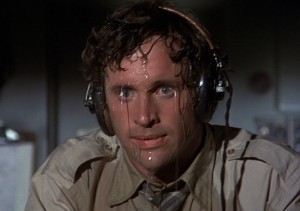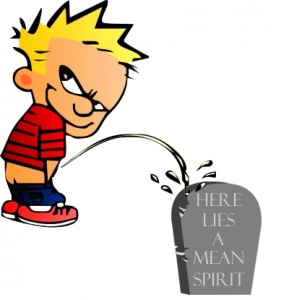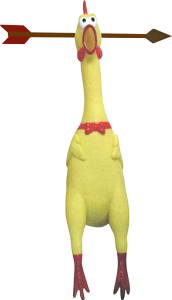When Reviews Are Negative (Or Worse)
 I almost never blog about reviews (especially poor ones). Truth is, I try not to read reviews very often. Every once in a while a top reviewer who requested a book copy will let me know they posted a review and I will go out and read it. But while I’m there, I can’t help myself from looking at the 5-10 new ones that have piled up. Most, whether favorable or not, are fair. And I’ve learned (at times, the hard way), to shine the nasty ones on. I mean, if we’re going to have a review system that allows anyone from the most deranged to the most lucid, the least educated to the most scholarly, the most dishonest to the pure of heart and mind, to post reviews (anonymously, if they so choose), we just have to accept the good with the bad.
I almost never blog about reviews (especially poor ones). Truth is, I try not to read reviews very often. Every once in a while a top reviewer who requested a book copy will let me know they posted a review and I will go out and read it. But while I’m there, I can’t help myself from looking at the 5-10 new ones that have piled up. Most, whether favorable or not, are fair. And I’ve learned (at times, the hard way), to shine the nasty ones on. I mean, if we’re going to have a review system that allows anyone from the most deranged to the most lucid, the least educated to the most scholarly, the most dishonest to the pure of heart and mind, to post reviews (anonymously, if they so choose), we just have to accept the good with the bad.
But every once in a while there is a review that just doesn’t make any sense, particularly when they don’t really match up with the rating or “number of stars”. Sometimes you’ll read the review and think they really liked the book but they gave it one or two stars; then you’ll read a review and think wow, this person despised this book—three or four stars.
The one thing I seem to find in common with all weird reviews (especially those who really make me think the reviewer is one click from bat-shit crazy) is that they are almost always very, very short. We’re talking two, maybe three, sentences. Whatever the minimum. And many define vagueness.
Horrible plot.
Too slow in the beginning.
Hard to like the character.
 I saw a one-star review the other day where the reviewer admitted she only gave the book a bad review because she was reading it on a Kindle and hated e-readers. No, not that the book was poorly-formatted for the e-reader; simply that she preferred real books.
I saw a one-star review the other day where the reviewer admitted she only gave the book a bad review because she was reading it on a Kindle and hated e-readers. No, not that the book was poorly-formatted for the e-reader; simply that she preferred real books.
I’ve theorized that some short reviews are written by people who are striving to be “top reviewers” as much as we authors are aspiring to become well-known writers (i.e. they want to reach the top of whatever numbering system measures them). In some cases I believe that’s why they write a quick review, click on however many stars, and move along to the next one. Who’s to say they ever read half (or any) of the books they review? A good synopsis can easily be turned into a review, good or bad (though not very in-depth). Amazon does enhance some part of their score by how many “helpful” ratings a review receives. But that system seems to have its flaws: people who read reviews to see if they want to buy a book can be just as squirrelly as reviewers—I’ve seen two sentence reviews with 40-50 “helpfuls”.
Where am I going with this?
I’m here to assuage your stress and pain.
 Don’t sweat the reviews. And definitely don’t sweat like Robert Hays in Airplane! Don’t get me wrong; that was a classic scene, and well worth watching (more than once). But few circumstances warrant your salt-watery concern, and poor reviews are not one of them
Don’t sweat the reviews. And definitely don’t sweat like Robert Hays in Airplane! Don’t get me wrong; that was a classic scene, and well worth watching (more than once). But few circumstances warrant your salt-watery concern, and poor reviews are not one of them
Anyone with a computer (or tablet, or smartphone, or library access) can write a review on any of the major book sale sites. Many are fair, well-thought, and offer their honest opinion of your book. Some don’t. You’ll read the words of some writers, raging and belittling the one-star review they just received—some even begging their friends to go out and immediately mark the review as “unhelpful” so that it never sees the light of day. It’s been my experience that real readers—those who simply want to find a great book and/or a talented author—will see through a mean-spirited, unhelpful review.
I’m not saying it’s easy to swallow those first few ill-forged “critiques”. It’s never easy to put down a horse-pill of bad commentary. But ask yourself these three questions:
1. Is there something in the review I can use?
(Many times, even an acerbic review, written in spiteful haste, has a hidden truth at its core. If not, no worries—move along.)
2. Is there anything I can do about it?
(Hint: there isn’t.)
3. Who had the wherewithal and the courage to write a book and present it for the world to read (and criticize)?
(Another hint: you.)
So take from each review you read any constructive criticism you can and get back to doing what YOU do. Write. And don’t ever, under any circumstances, comment on someone’s review (especially if it’s to defend your book, your honor, or your ego). Move along. Be an author.
 Here’s the one thing I can guarantee you: letting it get to you, and worse, showing publicly that it got to you, will not just make things worse—it will create a tsunami of bad juju. And you’ll be doing the one thing you never intended:
Here’s the one thing I can guarantee you: letting it get to you, and worse, showing publicly that it got to you, will not just make things worse—it will create a tsunami of bad juju. And you’ll be doing the one thing you never intended:
You’ll be feeding the monster.
Never feed the monster. In fact, if I could leave only one piece of advice for anyone—not just writers, but anyone who has been assaulted by those poison pens, tongues, fonts, and minds—it would be, simply, to starve the monster.
Everything needs sustenance. Ergo, if no one feeds the monster, the monster dies.
And regardless of what you might think (or what you were taught in grammar school), when a monster dies, an angel may not get its wings, but the world does breathe a sigh of contentment.
Or takes a leak on the monster’s grave; I can never remember which.
~~~~~~~~~~~~~~~~~~~~~~~~~~~~~~~~~~
The blank page is dead…long live the blank page.
~~~~~~~~~~~~~~~~~~~~~~~~~~~~~~~~~~
 Author known to use spontaneous satire, sarcasm, and unannounced injections of pith or witticisms which may not be suitable for humorless or otherwise jest-challenged individuals. (Witticisms not guaranteed to be witty, funny, comical, hilarious, clever, scintillating, whimsical, wise, endearing, keen, savvy, sagacious, penetrating, fanciful, or otherwise enjoyable. The Surgeon General has determined through laboratory testing that sarcasm can be dangerous, even in small amounts, and should not be ingested by those who are serious, somber, pensive, weighty, funereal, unsmiling, poker-faced, sober, or pregnant.) For those who enjoy and/or revel in the utterance of profanity, the author reserves the right to substitute “fish” for “fuck” without fear of repercussion, mental reservation, or purpose of evasion.
Author known to use spontaneous satire, sarcasm, and unannounced injections of pith or witticisms which may not be suitable for humorless or otherwise jest-challenged individuals. (Witticisms not guaranteed to be witty, funny, comical, hilarious, clever, scintillating, whimsical, wise, endearing, keen, savvy, sagacious, penetrating, fanciful, or otherwise enjoyable. The Surgeon General has determined through laboratory testing that sarcasm can be dangerous, even in small amounts, and should not be ingested by those who are serious, somber, pensive, weighty, funereal, unsmiling, poker-faced, sober, or pregnant.) For those who enjoy and/or revel in the utterance of profanity, the author reserves the right to substitute “fish” for “fuck” without fear of repercussion, mental reservation, or purpose of evasion.



Good points, as usual, Rob.
Question: Since asking at the end of the book for a review doesn’t always lead to one, what do you think of the idea of offering a discount for your (the author, I mean) next book to those that do?
I’m not sure there’s any surefire way to garner reviews. The only way I have seen significant numbers of increased reviews is, as Occam would agree, to simply move more books. Not to imply moving product is simple; only that it’s my experience that 1% of readers leave reviews. Period. So the most obvious solution is really the only one with legs.
I’ve given twenty books away explicitly to readers who promised to review honestly once finished, and ultimately received but 2-3 actual reviews. So the percentages seem to apply even under “agreements”.
Unfortunately, in the beginning reviews are crucial, as readers (and advertisers) use the numbers to decide whether or not a book is “worthy”. It’s a helluva conundrum, but that’s the way the tree shakes out. The best advice I have is to ask a lot of honest readers to read and review—enough that 1-3% of them will get you a dozen or so reviews. From then on, it’s volume.
Giveaways and free promotions help, but only if the downloaders are readers rather than hoarders. The latter will likely never read your book; they just can’t pass on anything free and eventually turn their e-reader into a garage-full of “junk” through which nothing can be found.
It is indeed a numbers game, for sure – only a percentage of those taking a review copy, or who are otherwise asked to review a book, will actually wind up writing one. (It takes a lot of time and effort to write a good book review, and sometimes, after reading even a book they liked, a reader just doesn’t quite know how to review it.)
I wrote an article with a list of 10+ ways to find reviewers – and how to go about querying them for the best chance of success, which you might find interesting. http://www.emptymirrorbooks.com/publishing/10-ways-to-find-reviewers-for-your-self-published-book.html
Nice post Rob! I get very few thoughtful negative reviews, but the few that are actually considered opinions, I always mark as useful – in the hope it will inform those who might not enjoy the book (no sense in attracting readers who are gonna hate the book).
As for getting reviews, as the other commenter mentioned, I sometimes email my list offering a free book in return for a review. That trends to get me 15-20 reviews and, seeing as they’re all coming from my email list, tend to be from people who already enjoy my work! I also find, the more expensive the book, the higher the review score. Free promotions invariably end up with a few trolls , but I rarely get bad ones at full price.
Well said!
I do read EVERY review. I can’t help myself. BUT…I’ve learned to read between the lines. I’ve learned to recognize the hateful, copycat reviews versus the readers who truly want to offer constructive criticism. And I learn from every one of them, good and bad.
Thank you for the encouragement, though, because no matter how silly or ridiculous the mean ones are, they still hurt.
All I can strive for is to get better and continue to write for the readers who love my stories. Thankfully, the happy readers outweigh the unhappy by ninety percent, and I’ll take those numbers any day.
Happy writing!
This is excellent advice, and something I’ve been telling authors myself. Once your work is out in the world, people are going to have varying opinions of it – and it’s exactly the differences in perspective that gives reviews value. I’ve seen many authors get into arguments with reviewers. The result is usually that they sabotage their own book sales, and careers.
I have a select group of readers who “review” my work before it is published. Theirs are the opinions that help me write better. The reviews that come after should, in theory, help or hinder sales. Apparently, they don’t. For example, I have accumulated 16 reviews of Rebels on the Mountain on Amazon, 14 of which are 5-star. The remaining 2 are 4-star. All have great write-ups. Sales? Not so great. Thus, I’m hardly concerned that a bad review is going to hurt. Meanwhile, I have a book, Vietnam: A Soldier’s Journal, published on Smashwords that has one review and it isn’t good. That book is downloaded an average of 15 times per day. Go figure…
Good post. The only review I ever commented on was one where she pointed out some errors. I corrected them and thanked her for catching them, and noting they were corrected.
I agree that one can learn from negative reviews, and I am of the opinion it’s better not to say anything. I hear more stories of things going badly when an author comments than I do of positive things coming out of saying something. It’s part of the process and one has to have a thick skin.
Hi Rob! Thank you for an insightful post that we can all appreciate. I read once, from a famous N. Y. Times best selling author, that he ignores them, and moves on. Not everyone is going to like what you write. For a novice writer, such as myself, I hope to learn from constructive criticism and improve. Have a great weekend.